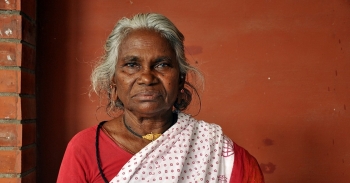
.jpg) F. M. Britto
F. M. Britto
.jpg)
The 12 years old bride came to stay with her husband Perumal in Pullucheri, Madurai district of Tamil Nadu. Chinna Pillai then went along with other village women to work in the fields of the high caste land owners.
Exploiting these landless dalits, the wealthy land owners paid them below normal wage. To meet their ends, these hapless labourers were forced to borrow at a high interest of 300 percent from the money lenders. Chinna Pillai, now a mother of two sons and three daughters, also became a victim.
Then local M P Vasimalai had a bright idea. The former student of the Indian Institute of Management (Ahmadabad) had forsaken attractive job to work at the grass root level. Later he headed the Dhan Foundation.
Vasimalai asked the women to form groups of 20 and every one to deposit monthly Rs 20. The cumulative amount was then lent to one of their group members, with the interest of only 60 percent. Though this interest too sounds big, compared to the 300 percent interest of the money-lenders, it is much less.
Inspired by this idea, the unschooled Chinna Pillai took up organising the women, in spite of resistance from the land owners, money-lenders and the apprehensive women themselves.
Initially in 1989, only 15 women joined the group. Seeing its success, gradually more women came forward to join the Vaigai Vattara Kalanjiam, presided over by Chinna Pillai, who knew only to sign her name.
These organised labourers also began to exert unified pressure on the landlords. These women also began to launch businesses like tailoring, running shops and dairies. They also won the bid to farm their fish in the village pond.
Their savings made the banks offer them loans for various development activities. Since money was lent only to those women whose husbands don’t drink alcohol, it forced them to start a de-addiction centre. Caste barriers began to disappear.
Within the last 30 years the movement has spread to 250 blocks, across 63 districts in 13 states covering some 60, 000 Self-Help Groups, aiding 1.2 million families.
For her pioneering work, Chinna Pillai was felicitated with many honours and awards. She had been nominated as a member of the Tamil Nadu Agricultural University (TNAU). She was awarded the Janaki Devi Bajaj Puraskar Award in 2001, the Porkizhi Award in 2001, Avvaiyar Award in 2018, and the fourth highest Indian Civilian Award, Padma Shree. While honouring her with the Shree Shakti Puraskar in 1999, overwhelmed by her work, then Prime Minister Atal Behari Vajpayee touched her feet. But the four-feet-tall Chinna Pillai says with her paan-stained smile, “The women driving the movement further have given me the real award.”
“Through the savings unit and education, I want every poor villager of India to come out of their compromised economic state and lead the dignified life they deserve,” says the 70 years old grandma bent with age.
“Every man is in his own hands, with a little help from his brothers.”